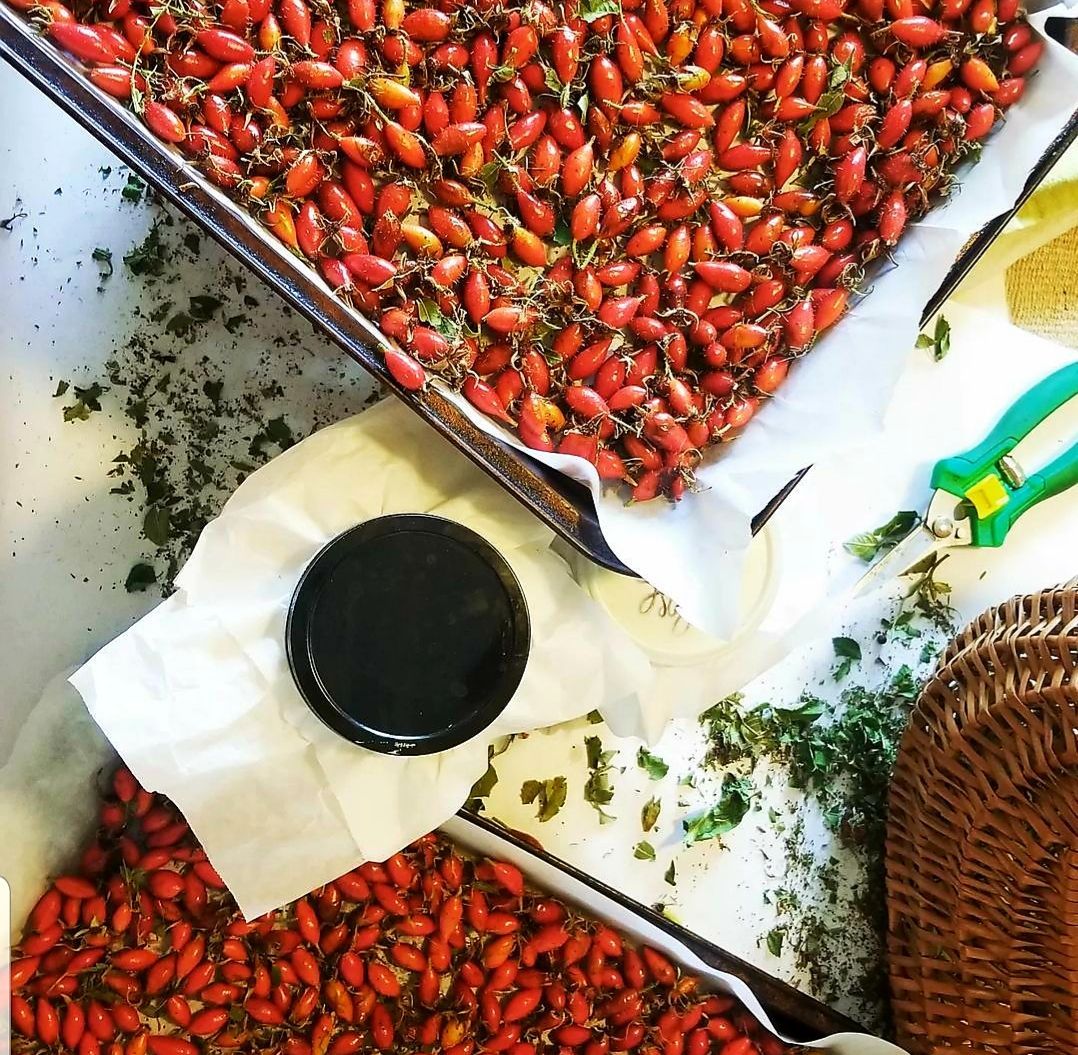The Many Wonders of Rose hips
A superb source of nourishment

Rose hips belong to the Rose genus of Rosaceae family which includes over 100 species. The two most commonly cultivated rose hips are for their medicinal benefits, the Rosa Canina also known as Common rose, Dog Rose or the Briar Rose and the Rosa Rugosa or the Japanese Rose.
The Rosa Canina is cultivated for the fruit of the hip. It can grow up to 10 feet tall and climbs other hedgerow shrubs and trees. They bloom between April and July bearing pale pink fragrant flowers. Once the flower has dropped the rose hips develop and these are picked in the autumn.
Rose hips grow wild quite readily in nutrient rich soil along paths and forest sides. The Rosa Canina have taken to my gardens and continue to thrive each year. I cut back the bush in the Autumn after the Rose hips have been harvested. The fruits are ripe when they can be picked easily and the fruit is bright and soft to the touch. There are many ways to process Rose hips.
Rich in lore, rose hips have been prepared as food and medicine since ancient times. Hildegard Von Bingen writes of numerous ways to prepare and utilize the rose hips. You can make teas, jams, purees, vinegar, soup, and even liquor. Rose hip tea continues to be popular in Europe today. The Swedes make a classic rose hip soup and the jams are most often made from the fruit in the Middle East.
Rose hips in any form are good for protection from infections, said Hildegard and were used extensively in the new year to combat fatigue and to strengthen the immune system. Hips are considered anti-inflammatory and have pain relieving properties. They help to regulate digestion through its rich source of pectin, may relieve cramps and nausea and act as a mild diuretic, which may alleviate bladder problems. Hildegard also recommended rose hips in a purification formula for the Springtime.
Historically rose hips have been prepared without the seeds. Research today shows that the Vitamin C levels are highest in the seeds, the pesky hard and numerous seeds that have tiny hairs that cluster within the fruit. Hildegard speaks of taking the effort to dry the peel of the hip for bladder and kidney problems due to their high content of plant acids. She would cook the fruit whole in a little water for a few minutes until soft and then pass the ingredients through a sieve to make a puree. Through experience I have found that you can dry the hips easily on screens where there is plenty of air to circulate and they are turned ever so often to avoid becoming moldy. Once they are dry, which takes about six weeks, they are stored in paper bags and ground for tea throughout the winter.
If you choose to dry them in an oven assure that the temperature is no greater than 100 degrees Fahrenheit to preserve the Vitamin C. They are in both the Dharani Healthy Digestion and the Spring Tonic tea. This year I explored making vinegar with fresh rose hips and the sprigs of fresh rosemary which is rather delicious.
HIldegard mentions that rose hips may have as much as twenty times the Vitamin C as that of a lemon. Depending on the soil and the growing conditions and processing techniques the amount of Vitamin C per batch can vary greatly. It is estimated that 2 tbsp. of dried wild Rose Hips can provide up to 76% of your daily Vitamin C requirements. Vitamin C plays a key role in the production of collagen synthesis and your immune health.
There is also Vitamin A, 4%, B5, 3% and Vitamin E 6% respectively. In addition the rose hips contain trace minerals, zinc and copper. Rose hips get their color from carotenoid pigments known as lycopenes and beta carotene. These pigments have been shown to promote skin and eye health. They are also rich in antioxidants such as catechins, quercetin and ellagic acid. A diet rich in these compounds can help to lower inflammation and reduce free radical damage in your body.
Other research according to healthline.com suggests that rose hips may boost heart health by lowering blood pressure. In a 6 week study where 31 people drank a rose hip beverage containing 40 g of rose hip powder per cup per day led to significant reduction in blood pressure and cholesterol, compared with the control group.
Another study suggests that supplementing with rose hips on a daily basis may reduce the pain and inflammation associated with osteoarthritis, a gradual decline in cartilage of your joints, although it did not appear to improve the range of motion.
Finally, rose hips prepared in oil have traditionally been an anti-aging substance in the beauty industry.
Due to the rich source of polyunsaturated fats, rose hips support healthy skin membranes and protect your skin from inflammatory compounds such as ultraviolet rays, pollution and smoke. In one small study according to Healthline.com 3 mg of rose hip powder taken daily led to a significant decrease in skin wrinkles and an increase in your skin moisture and elasticity. I can confirm this, as for years, I have been applying a Rose face cream prepared with a rose hip oil, as one of the ingredients. The research found that these results are due to rose hips' robust antioxidant levels, pectin levels and fatty acid profile. In addition, rose hip oil has been shown to increase collagen synthesis, the rate at which your skin cells replenish. This may also be the reason rose hips benefit wound healing as well, showing the use of rose hip oil can expedite a wound to heal and therefore, you may find there is less scarring.
Rose Hips are easy to grow. Why don't you begin this year to benefit with the wonder of the simple rose hip. Rosa Canina may support your health in numerous ways; to supply you with abundant Vitamin C throughout the winter, to help your digestion, to protect your heart health, to sustain your skin and eye health as well as ease your bones. Book an appointment with Dharani Healing Arts today, your local and global Holistic Health Practitioner here to guide you and to support you on your journey to whole health. Rosa Canina is the people’s medicine nourishing divine health.
www.healthyhildegard.com/rose-hip-benefits/
www.healthline.com/nutrition/rose-hips
dharanihealingarts.com
